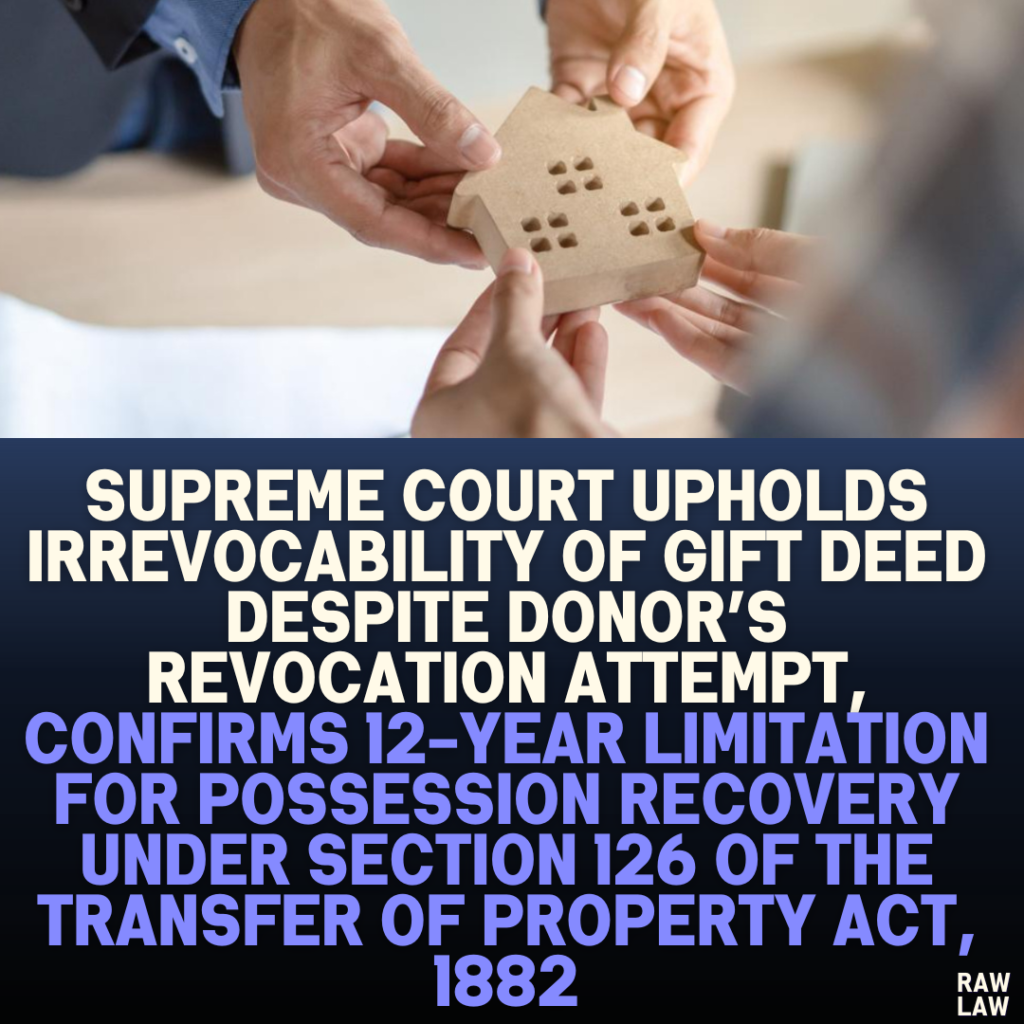Court’s Decision:
The Supreme Court dismissed the appeal, upholding the first appellate court and High Court’s findings that the gift deed was irrevocably valid and could not be revoked by the donor as it had been duly accepted and acted upon by the donee. The Court found no merit in the appellant’s argument and confirmed the plaintiff-respondent’s absolute title over the suit property based on the registered gift deed.
Facts:
The plaintiff, Tamil Nadu Khadi and Village Industries Board, filed a suit seeking a declaration of its title over a property of approximately 3750 square feet and for possession recovery. The claim was based on a registered gift deed dated March 5, 1983, executed by the defendant-appellant, which transferred the property to the plaintiff for Khadi manufacturing purposes. The plaintiff asserted that the deed was valid, accepted, and acted upon. However, the defendant attempted to revoke this deed through a revocation deed on August 17, 1987, arguing that it had not been properly accepted.
The Trial Court initially dismissed the suit, ruling that the gift deed was not valid as it had not been accepted. This decision was reversed by the District Judge, who decreed the suit, affirming the gift’s validity. The High Court dismissed the defendant’s second appeal, leading to this Supreme Court appeal.
Issues:
- Whether the gift deed was validly executed, accepted, and acted upon.
- Whether the revocation deed executed by the donor on August 17, 1987, was legally effective.
- Whether the plaintiff’s suit was barred by limitation.
Petitioner’s Arguments:
The appellant contended that the gift deed was not accepted by the donee and, therefore, was invalid. Furthermore, it was argued that the plaintiff’s suit for declaration and possession was barred by limitation as it was filed after the revocation.
Respondent’s Arguments:
The respondent countered that the gift deed had been accepted and acted upon, as evidenced by subsequent possession and property mutation applications. It was argued that the gift was irrevocable since no right to revoke was reserved in the deed.
Analysis of the Law:
The Court referred to Section 126 of the Transfer of Property Act, 1882, which outlines conditions under which a gift may be revoked. A gift deed cannot be revoked unless:
- The donor and donee agree that the gift shall be revoked on the occurrence of a specific event independent of the donor’s will.
- The deed explicitly states it may be revoked at the mere will of the donor.
- The gift could be considered a contract that might be rescinded.
Since none of these conditions applied to this gift deed, the Court held it was irrevocable.
Precedent Analysis:
The Court cited C. Mohammad Yunus vs. Syed Unnissa And Ors. (AIR 1961 SC 808), establishing that in a suit involving a declaration of title with a further relief (like possession), the limitation period is governed by the ancillary relief sought. In this case, the ancillary relief was possession, with a 12-year limitation under Article 65 of the Limitation Act.
Court’s Reasoning:
The Court noted that the gift deed explicitly transferred all rights from the donor to the donee without any clause permitting revocation. Evidence indicated that the gift had been accepted and acted upon by the plaintiff through actions like applying for mutation and taking possession. Therefore, the deed was irrevocable.
The Court also reasoned that the suit’s limitation period began with the possession issue, allowing a 12-year timeframe. Given that the suit was filed within this period, it was not barred by limitation.
Conclusion:
The Supreme Court held that the gift deed was irrevocable and dismissed the appeal, confirming the plaintiff’s title and possession rights.
Implications:
This judgment underscores the irrevocability of gift deeds unless specific contingencies under Section 126 of the Transfer of Property Act, 1882, are met. It affirms that limitations in suits concerning both declaration and possession are governed by the relief sought for possession, granting a longer timeframe for legal recourse. This decision solidifies legal protections for donees receiving gifts under irrevocable deeds and emphasizes the finality of such transfers.




Pingback: Bombay High Court Upholds Personal Liberty in Marital Relations, Allows Dissolution of Marriage Amid Allegations of Forced Conversion and Cohabitation Dispute; Directs Police to Maintain Contact with Corpus - Raw Law
Pingback: Delhi High Court Upholds Presumption of Genuineness for Registered Gift Deed and Will, Dismisses Co-Ownership Claim, and Directs Plaintiff to Pay Ad-Valorem Court Fee in Property Dispute - Raw Law